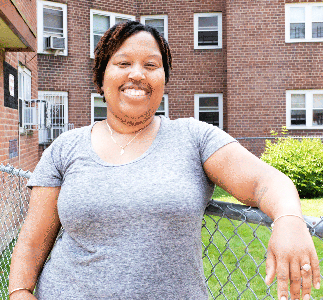Mia Farris grew up in the town of New Rochelle and earned a BA degree from a local college. She now lives there with her 17-year-old daughter, who will graduate from high school next spring.
For years, Mia supported the two of them by working as a cashier and then as a manager in retail. Eight years ago, she got a job with the City of New Rochelle. She qualified for Section 8 rental assistance, and Mia and her daughter moved into an apartment that she says was perfect for them. “It is a beautiful environment with trees and playing fields. I like it for my daughter. It’s very safe.”
Hurricane Ida hit New York in September of 2021 and destroyed Mia’s car, which had been paid off, so she had the added burden of a car payment every month. Then, with the anticipated costs of her daughter’s graduation activities, the expenses continued to grow. To add to all this, Mia was notified that she no longer qualified for her Section 8 subsidy. It was all enough to put Mia and her daughter over the edge, and Mia began to fall behind on her rent. She remembers, “I was so worried I started to lose my hair … you go to sleep with it, wake up with it, you’re always thinking about how to make ends meet.”
Mia knew she needed help before she got even deeper in arrears. From her work in the New Rochelle housing office, she knew of The Bridge Fund of Westchester. Her arrears totaled $2,924. She reached out and with their assistance was able to get back on track. The Bridge Fund was able to assist with $2,124 through the Emergency Food and Shelter Program (EFSP) funds, and Mia’s contribution of $800 gave her the fresh start she needed. “I was surprised that even though I was working I could get help. The Bridge Fund treated me wonderfully. They even provided budget counseling. I am so grateful.”
Today, she and her daughter look out their window at the lush landscape before them, so glad to be in their home.
“You go to sleep with it, you wake up with it, you’re always thinking about how to make ends meet.”


